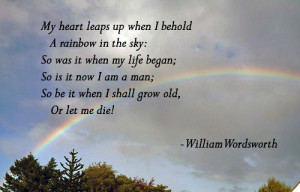Emotion, passion, individuality—when you hear these words, what comes to mind? If you didn’t think of the British Romantic poets of the late 1700s, then I think you should reconsider that, and I am here to tell you why. This week, Dead Poets Society is taking a look at one of the most significant poetic movements of all time and definitely has some really beautiful poems to delve into as well as some of the most interesting and remembered poets of all time.
As I mentioned earlier, Romanticism was a movement that developed in the late 18th century. It was largely a reaction against a previous intellectual movement known as the Enlightenment, which dominated European philosophy, politics, and art from the mid 17th century to the end of the 18th century. While the Enlightenment thinkers valued boring things like reason and logic, the Romantic thinkers were not about that at all. The Romantics were more focused on the ideas and feelings of the individual and tapping into the potential of imagination. They also had a fascination with nature and explored man’s relationship to it in a mystical sort of sense.
Of the major poets involved in the Romantic era, some of these names may actually be pretty familiar to you. I know I’ve studied a few of them in my English classes before. William Blake, Samuel Taylor Coleridge, Lord Byron, John Keats, and William Wordsworth, just to name a few, are all staples of high school English classes.
To start with, I’d like to take a look at a poem by John Keats. In July of 1820, Keats published his best known and most acclaimed book of poetry called Lamia, Isabella, The Eve of St. Agnes, and Other Poems. The poems in this book centered on myths and legends of the ancient, medieval, and Renaissance time periods and contains a few poems considered among the best. One of these poems is known as “Ode on a Grecian Urn,” which details images that are on an ancient Greek urn. Here is a stanza that I found particularly interesting in its imagery:
“Who are these coming to the sacrifice?
To what green altar, O mysterious priest,
Lead’st thou that heifer lowing at the skies,
And all her silken flanks with garlands drest?
What little town by river or sea shore,
Or mountain-built with peaceful citadel,
Is emptied of this folk, this pious morn?
And, little town, thy streets for evermore
Will silent be; and not a soul to tell
Why thou art desolate, can e’er return.”
Next up is another important member of the Romantic poet movement—Mr. Samuel Taylor Coleridge. Coleridge was particularly influenced by philosophy, especially Plato’s Republic and even made plans with his college classmate to create a community similar to that of the Republic. It involved immigrating to the New World and establishing society with equal government by all. Obviously, this plan did not work out, but he did write some pretty cool poems. Check out this one, titled ‘Answers to a Child’s Question’:
“Do you ask what the birds say? The Sparrow, the Dove,
The Linnet and Thrush say, “I love and I love!”
In the winter they’re silent—the wind is so strong;
What it says, I don’t know, but it sings a loud song.
But green leaves, and blossoms, and sunny warm weather,
And singing, and loving—all come back together.
But the Lark is so brimful of gladness and love,
The green fields below him, the blue sky above,
That he sings, and he sings; and for ever sings he—
“I love my Love, and my Love loves me!”
Although there are so many other great poets and poems to be found in the Romantic movement, it would take much too long to go through all of them. But, if any of you feel particularly inspired by this week’s post, I’d encourage you to check out some of the other poets; I particularly enjoy poems by William Blake and William Wordsworth. I hope you enjoyed this dive into the past and wish you all happy reading!


I am so sad that your blog is over. It was always so exciting to see what theme you chose for the week. And honestly, it was my lazy way of staying educated on the subject of poetry, which I thank you for. Also I love all the history in this post, and the last line “I love my Love, and my Love loves me!” I love love. Fantastic post!!
Grace,
I really liked the excerpts you provided in this week’s blog post, specifically the one about the Grecian urn. The way you tied in the history of the Romantic era to the style of poetry it produced gives a lot of context to the poems and it explains why they were written the way they were written. Over the past semester, I really liked reading your blog and I learned a lot about poetry! Great work!
Sangeetha